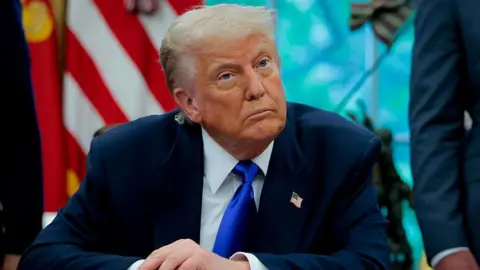In a recent development, United States President Donald Trump has hinted at what he labeled as a “major trade deal,” a move that marks the first such agreement since imposing tariffs on various of America’s trading allies. This announcement comes amidst a backdrop of global trade negotiations that have been gaining momentum. Trump is set to hold a news conference at 10:00 AM in Washington, D.C., which will likely reveal more details about this anticipated trade agreement. The announcement was made via Trump’s Truth Social platform, but specifics about the country involved have not yet been disclosed.
According to multiple U.S. media outlets, indications suggest that the trade deal might involve the United Kingdom. Sources close to the negotiations have hinted at potential discussions about reaching an agreement with UK officials. The BBC has taken the step of reaching out to both the White House and the UK’s Department for Business and Trade to obtain comments regarding these reports, but no official statement has emerged as of yet.
The backdrop to this anticipated deal is essential. Earlier in April, Trump unveiled steep tariffs impacting numerous countries, only to later announce a temporary 90-day pause on such levies, allowing some reprieve. Governments worldwide have been striving to secure trade agreements with the U.S. before the reinstatement of these tariffs, which has injected a new sense of urgency into international trade talks.
Moreover, a 10% global tariff imposed by Trump remains in effect, impacting the UK and several other nations. It’s important to note that the UK has been spared from the higher “reciprocal” tariffs that Trump has instituted against many other trading partners. However, the country is still subjected to a substantial 25% import tax on specific categories such as steel, aluminum, and automobiles. This indicates the complex web of tariffs that currently shape the U.S.-UK trade relationship.
In addition to discussions with the UK, the Trump administration appears to be approaching business negotiations with other countries, such as India and Israel, suggesting potential trade deals may soon be forthcoming. Ongoing talks reportedly include nations like Japan, South Korea, and Vietnam, indicating a broader strategy to reshape the United States’ global trade landscape.
Trump’s intent to foster new bilateral agreements is evident as he aims to radically alter the existing global trading order. This is a significant pivot from previous U.S. trade policy, which some analysts argue has relied heavily on multifaceted agreements rather than focusing on singular bilateral deals. The potential trade deal with the UK signifies a noteworthy shift that could reshape economic ties, especially in the post-Brexit era.
Further reports detail that, in the broader context of trade negotiations, Trump has expressed a willingness for allied nations to engage with the U.S. in a manner that favors American interests. This approach aligns with his broader economic strategy, which includes reducing America’s trade deficits and strengthening its manufacturing sector.
As the anticipated news conference draws nearer, all eyes will be on Trump to see how this “major trade deal” unfolds. Readers are left to ponder the implications of such a development on not only U.S. trade policy but also the global economic landscape, markedly how the potential agreement with the UK could affect future negotiations with other nations. As globalization continues to evolve, the choices made by Trump and his administration in the coming weeks may have significant long-term effects on international commerce and trade partnerships.



